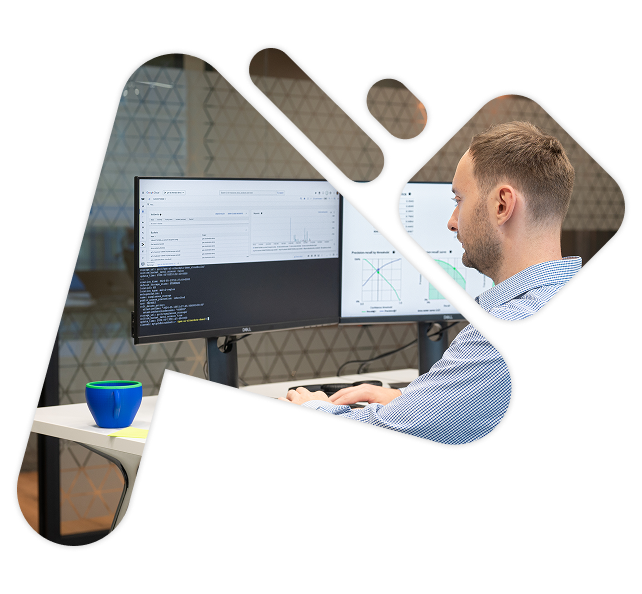Machine Learning Consulting Services
We create Machine Learning models that learn by analyzing data and their own performance to forecast trends, optimize processes, and personalize user experiences.
Let’s talk
We empower leaders:










Machine Learning enables faster, smarter responses.
Use advanced machine learning technologies to analyze data and make decisions based on insightful and personalized recommendations, without the need for advanced technical knowledge.

Efficient decision-making
Machine learning algorithms enable data-driven management by optimizing business processes based on reliable data and predictions.
They provide a comprehensive view of the business and support agile responses to changes.

Personalization of customer experiences
Segmentation powered by machine learning helps companies tailor content across platforms like stores and games to meet users’ needs.
This improves customer satisfaction, enhances the user experience (UX) and customer experience (CX), and boosts sales performance with targeted content.

Better marketing and sales
Machine Learning (ML) algorithms predict advertising outcomes and optimize messaging for targeted demographics, helping businesses improve engagement and maximize campaign success.

Maximizing revenue
Demand forecasting with machine learning leverages trends and seasonality to manage warehouse efficiency, meet customer needs, and prevent overstock or understock situations.

Predict failures and downtime
Using ML consulting services, production systems can monitor data from sensors to detect potential failures and identify optimal maintenance times, improving operations.

Forcast of key metrics
Machine learning consulting supports KPI prediction to evaluate business strategies and optimize resource allocation, driving efficiency and growth for clients.
Discover even more of the possibilities of ML
Let’s talkCreate an ML model with a partner who understands business
At every stage of building Machine Learning solutions, we ensure that the solution supports better business management and removes guesswork from your decision-making processes.
Knowledge and expertise at every stage:
We analyze the problem and propose a solution.
We identify business challenges and their context, and define what the future scenario of using the ML model will look like. We propose a solution that genuinely addresses the company’s challenges.
Data preparation for model training
We gather, clean, and analyze data, ensuring a thorough data collection process, which is crucial for shaping the features of the machine learning model.
We create, train, and develop the ML model.
We select algorithms and “train” them on the training data. A data scientist plays a crucial role in creating and training these machine learning models. We evaluate them by measuring accuracy, precision, sensitivity, and other metrics, and then choose the best model for deployment.
Data Scientists deploy and orchestrate the model.
Our experts sets up the production environment and deploys the machine learning model as part of comprehensive development services. Our data scientists handle orchestration to ensure efficiency and consistency throughout the model’s lifecycle.
We monitor the effectiveness, update, and improve.
Our machine learning consultants monitor metrics, collect data, and enhance machine learning capabilities to ensure consistent performance. They verify proper model usage, detect any changes that could impact performance, and implement necessary updates and improvements.
We implement automated CI/CD management.
We implement a process that includes integration configuration (CI), automated testing, building and integrating the model, deployment configuration (CD), post-deployment monitoring, and continuous improvement.

See how to build a data-driven company.
Let’s talkDiscover our clients’ success stories

We automated document processing for Nexery and recovered over 2,000 hours of team work time
We helped Nexera manage its growing collection of documents related to leased infrastructure. Using GenAI technology and our proprietary data extractor, we automated the processing of nearly 30,000 documents—decisions, contracts, attachments—and created a document classifier and tools for exporting data to the company’s internal systems.
The result? Savings of over 2,000 working hours, full control over liabilities, elimination of payment errors, and realistic cost forecasts. The Nexera team gained new skills and a ready-made base for further automation of document processing.

We increased Tutlo user engagement with machine learning models
We helped the Tutlo educational platform better understand student and teacher behavior by implementing a personalized ML model in the BigQueryML environment. By analyzing over 80 variables and segmenting users, we created a precise model that predicts student engagement, which translated into a more personalized learning experience.
The result? 80% prediction accuracy, faster business decisions, greater motivation to learn, and more intuitive use of the platform—all without the need to migrate data between systems.

We reduced storage costs by 30% for an e-commerce company
We helped an e-commerce client organize data from multiple sales channels, build a data warehouse in BigQuery, and implement ML models to forecast demand and optimize inventory levels. We automated ordering processes by integrating algorithms with logistics operations.
The result? 30% less excess inventory, 15% higher sales of bestsellers, and significant savings thanks to better purchasing planning and reduced sales.

We helped AMS transform data from advertising media into measurable campaign results
In cooperation with the leader in OOH/DOOH advertising, we have created a scalable data warehouse and integrated external sources such as Proxi.cloud and CitiesAI. Thanks to the implementation of BigQuery and Machine Learning, AMS can now plan advertising campaigns in near real time, target them based on audience behavior, and analyze their effectiveness with unprecedented precision.
The result? Higher return on investment for customers, better campaign targeting, and maintaining a leading position in the era of advertising digitization.
Predict events before they happen
Our Machine Learning services solve real customer problems

You want to make better decisions
ML analyzes vast amounts of data and helps identify patterns, allowing businesses to predict future trends and outcomes.

You want to reduce the risk
Quantifying the probability of business risks materializing (e.g. non-payment of receivables, damage during transport) allows for optimizing activities.

You want to reduce customer churn
Detecting engagement drops using ML consulting services, enabling proactive actions to retain customers.

You want to increase the efficiency of models
Optimize machine learning algorithms to handle large datasets efficiently, ensuring faster processing and improved performance.

You want to allocate the budget more efficiently
ML consulting predicts campaign effectiveness and identifies profitable channels, which increases marketing strategies.

You aim to personalize offers
Analyze customer behaviors and preferences to deliver personalized recommendations, boosting satisfaction and driving sales.

Detecting fraud and abuse
Identifying and blocking malicious bots to protect platform resources and eliminate fraud.

You intend to test strategies
Simulators allow testing sales and marketing strategies to predict their potential effects before implementation.
Discover the benefits of working with Alterdata
End-to-end execution
We provide comprehensive support, from understanding your needs to maintaining and expanding with new features.
We also provide ongoing assistance at every stage of the solution lifecycle for your company.
Tailored services
We create custom Machine Learning models tailored to your needs and budget. Our expertise includes managing various machine learning projects, customizing solutions to fit specific project requirements.
Alterdata’s data scientists consider your industry specifics, company size, business goals, and other key factors to provide you with maximum benefits.
Team of professionals
Alterdata specialists, including experienced data scientists, have the knowledge and years of experience in implementations across various industries.
For your project, we select those who best understand your requirements.
Broad tech-stack
Our team leverages modern and efficient technologies, including natural language processing selected according to client needs to effectively achieve business goals.
This enables us to create solutions that perfectly address organizational needs and support their growth.
Data team as a service
We provide you with the support of a dedicated team of data engineering and analytics experts, offering comprehensive machine learning services tailored to your specific needs, available whenever you need it.
This also includes help in expanding your architecture with new functionalities and training employees.
Data security
We work within your environment and do not extract any data from it, ensuring its security.
You decide which information we can access during our work.
Base your success on our expertise
Tech stack: the foundation of
our work
Discover the tools and technologies that power the solutions created by Alterdata.

Google Cloud Storage enables data storage in the cloud and provides high performance, offering flexible management of large datasets. It ensures easy data access and supports advanced analytics.

Azure Data Lake Storage is a service for storing and analyzing structured and unstructured data in the cloud, created by Microsoft. Data Lake Storage is scalable and supports various data formats.

Amazon S3 is a cloud service for securely storing data with virtually unlimited scalability. It is efficient, ensures consistency, and provides easy access to data.

Databricks is a cloud-based analytics platform that combines data engineering, data analysis, machine learning, and predictive models. It processes large datasets with high efficiency.

Microsoft Fabric is an integrated analytics environment that combines various tools such as Power BI, Data Factory, and Synapse. The platform supports the entire data lifecycle, including integration, processing, analysis, and visualization of results.

Google BigLake is a service that combines the features of both data warehouses and data lakes, making it easier to manage data in various formats and locations. It also allows processing large datasets without the need to move them between systems.

Google Cloud Dataflow is a data processing service based on Apache Beam. It supports distributed data processing in real-time and advanced analytics.

Azure Data Factory is a cloud-based data integration service that automates data flows and orchestrates processing tasks. It enables seamless integration of data from both cloud and on-premises sources for processing within a single environment.

Apache Kafka processes real-time data streams and supports the management of large volumes of data from various sources. It enables the analysis of events immediately after they occur.

Pub/Sub is used for messaging between applications, real-time data stream processing, analysis, and message queue creation. It integrates well with microservices and event-driven architectures (EDA).
Google Cloud Run supports containerized applications in a scalable and automated way, optimizing costs and resources. It allows flexible and efficient management of cloud applications, reducing the workload.

Azure Functions is another serverless solution that runs code in response to events, eliminating the need for server management. Its other advantages include the ability to automate processes and integrate various services.

AWS Lambda is an event-driven, serverless Function as a Service (FaaS) that enables automatic execution of code in response to events. It allows running applications without server infrastructure.

Azure App Service is a cloud platform used for running web and mobile applications. It offers automatic resource scaling and integration with DevOps tools (e.g., GitHub, Azure DevOps).

Snowflake is a platform that enables the storage, processing, and analysis of large datasets in the cloud. It is easily scalable, efficient, and ensures consistency as well as easy access to data.

Amazon Redshift is a cloud data warehouse that enables fast processing and analysis of large datasets. Redshift also offers the creation of complex analyses and real-time data reporting.
BigQuery is a scalable data analysis platform from Google Cloud. It enables fast processing of large datasets, analytics, and advanced reporting. It simplifies data access through integration with various data sources.

Azure Synapse Analytics is a platform that combines data warehousing, big data processing, and real-time analytics. It enables complex analyses on large volumes of data.

Data Build Tool simplifies data transformation and modeling directly in databases. It allows creating complex structures, automating processes, and managing data models in SQL.

Dataform is part of the Google Cloud Platform, automating data transformation in BigQuery using SQL query language. It supports serverless data stream orchestration and enables collaborative work with data.
Pandas is a data structure and analytical tool library in Python. It is useful for data manipulation and analysis. Pandas is used particularly in statistics and machine learning.

PySpark is an API for Apache Spark that allows processing large amounts of data in a distributed environment, in real-time. This tool is easy to use and versatile in its functionality.

Looker Studio is a tool used for exploring and advanced data visualization from various sources, in the form of clear reports, charts, and interactive dashboards. It facilitates data sharing and supports simultaneous collaboration among multiple users, without the need for coding.

Tableau, an application from Salesforce, is a versatile tool for data analysis and visualization, ideal for those seeking intuitive solutions. It is valued for its visualizations of spatial and geographical data, quick trend identification, and data analysis accuracy.

Power BI, Microsoft’s Business Intelligence platform, efficiently transforms large volumes of data into clear, interactive dashboards and accessible reports. It easily integrates with various data sources and monitors KPIs in real-time.

Looker is a cloud-based Business Intelligence and data analytics platform that enables data exploration, sharing, and visualization while supporting decision-making processes. Looker also leverages machine learning to automate processes and generate predictions.
Terraform is an open-source tool that allows for infrastructure management as code, as well as the automatic creation and updating of cloud resources. It supports efficient infrastructure control, minimizes the risk of errors, and ensures transparency and repeatability of processes.

GCP Workflows automates workflows in the cloud and simplifies the management of processes connecting Google Cloud services. This tool saves time by avoiding the duplication of tasks, improves work quality by eliminating errors, and enables efficient resource management.

Apache Airflow manages workflows, enabling scheduling, monitoring, and automation of ETL processes and other analytical tasks. It also provides access to the status of completed and ongoing tasks, as well as insights into their execution logs.
Rundeck is an open-source automation tool that enables scheduling, managing, and executing tasks on servers. It allows for quick response to events and supports the optimization of administrative tasks.

Python is a programming language, also used for machine learning, with libraries dedicated to machine learning (e.g., TensorFlow and scikit-learn). It is used for creating and testing machine learning models.

BigQuery ML allows the creation of machine learning models directly within Google’s data warehouse using only SQL. It provides a fast time-to-market, is cost-effective, and enables rapid iterative work.

R is a programming language primarily used for statistical calculations, data analysis, and visualization, but it also has modules for training and testing machine learning models. It enables rapid prototyping and deployment of machine learning.

Vertex AI is used for deploying, testing, and managing machine learning models. It also includes pre-built models prepared and trained by Google, such as Gemini. Vertex AI also supports custom models from TensorFlow, PyTorch, and other popular frameworks.

Bartosz Szymański
Data Strategy and Customer Relations Director
Your data holds potential.
Ask us how to unlock it
FAQ
What if data quality issues arise in the future?

The Machine Learning solutions we implement include built-in mechanisms to verify the quality of input data. If anomalies or a decline in quality are detected, we assist clients in identifying causes—such as in source systems—and in resolving them. This ensures the continuous accuracy and reliability of model performance, minimizing the impact of data issues on your company’s outcomes.
What will the maintenance of the solution look like?

We offer full support in maintaining the solution, including updates, monitoring, and training, to ensure the long-term efficiency of the model.
Will my team have access to the code?

Your team will have full access to the code if such an arrangement is agreed upon. We prioritize transparency and collaboration, supporting the development of your team’s skills.
Is the company technologically objective and will it consider our technology preferences?

Alterdata is technologically independent. Our recommendations are always based on your preferences and the best solutions available on the market, ensuring optimal effectiveness and alignment with your requirements. We partner with many technology providers but do not sell their products. This gives us maximum objectivity in selecting the most suitable technology to solve your problem.
Is Machine Learning a solution only for large companies?

No, Machine Learning is a solution accessible to companies of all sizes. With our tailored approach, we always select the most effective and cost-efficient methods to address specific challenges. We apply the right level of algorithm complexity that makes sense – when a problem can be solved with a quick and affordable algorithm, we deliver that solution. This makes ML financially viable even for small businesses, quickly providing value by solving challenges and optimizing processes.
How will I measure the results of implementing a Machine Learning model?

The results of implementation can be measured through various indicators, such as increased business outcomes from automation or greater forecast accuracy in a specific area. This allows for the identification of key success metrics, such as cost reduction, improved user retention, ROI, or other metrics relevant to your company.
How long does it take to implement a Machine Learning model?

The implementation time depends on the complexity and specifics of the project. It is crucial to clearly define the use case, understand the challenge, and select the appropriate input data. The process can take anywhere from a few days to several months, depending on the project’s scope and goals. At the start of the collaboration, we establish a realistic timeline tailored to your needs and expectations.

























